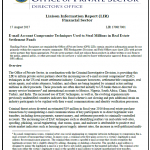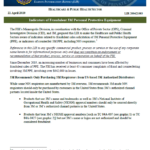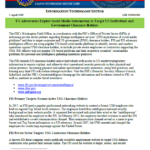
The Office of Private Sector, in coordination with the Criminal Investigative Division, is providing this LIR to inform private sector partners about the increasing use of e-mail account compromise (EAC) techniques in the US real estate settlement industry. Consumer borrowers, settlement/title companies, real estate agents, real estate attorneys, builders, and others are being targeted by criminal actors netting millions in illicit proceeds. These proceeds are often directed initially to US banks then re-directed via money service businesses and international accounts to Mexico, Nigeria, South Africa, China, Ghana, Turkey, and India. The increased use of EAC techniques, as well as, the evolving expansion into previously unidentified countries indicates this fraud scheme is not slowing and puts additional strain on industry participants to be vigilant with their e-mail communications and identity verification processes.
Read more →



